 Petzlover
Petzlover Both Silken Windhound and Toy Australian Shepherd are originated from United States. Silken Windhound may grow 24 cm / 10 inches higher than Toy Australian Shepherd. Silken Windhound may weigh 11 kg / 25 pounds more than Toy Australian Shepherd. Silken Windhound may live 5 years more than Toy Australian Shepherd. Both Silken Windhound and Toy Australian Shepherd has almost same litter size. Silken Windhound requires Low Maintenance. But Toy Australian Shepherd requires Moderate Maintenance
Both Silken Windhound and Toy Australian Shepherd are originated from United States. Silken Windhound may grow 24 cm / 10 inches higher than Toy Australian Shepherd. Silken Windhound may weigh 11 kg / 25 pounds more than Toy Australian Shepherd. Silken Windhound may live 5 years more than Toy Australian Shepherd. Both Silken Windhound and Toy Australian Shepherd has almost same litter size. Silken Windhound requires Low Maintenance. But Toy Australian Shepherd requires Moderate Maintenance
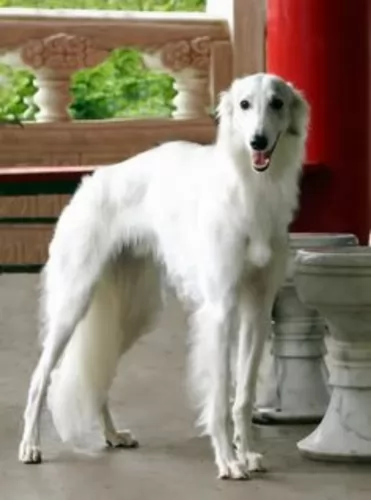 The Silken Windhound is a breed intentionally developed by Borzoi and Deerhound breeder, Francie Stull. Although the first litter of the Windhoud was not born until 1995, their development began in discussions ten years later. Bred as a cross between her beloved Deerhounds and Borzoi, the first Society for the breed formed in 1999 and they were recognized by the UKC in 2011.
The Silken Windhound is a breed intentionally developed by Borzoi and Deerhound breeder, Francie Stull. Although the first litter of the Windhoud was not born until 1995, their development began in discussions ten years later. Bred as a cross between her beloved Deerhounds and Borzoi, the first Society for the breed formed in 1999 and they were recognized by the UKC in 2011.
Ms. Stull wanted another breed for her kennel and decided on a smaller sighthound than her Borzoi. She wanted a long coat, a good temperament, good health, and possessing the same athletic abilities, grace and poise as the sighthounds that are larger. She developed the Silken Windhound based on this vision.
With this in mind, the kennel purchased the pick of a litter from the American and English Borzoi Champion bitch, Stillwater Virginia Reel. This puppy was eventually bred to Stillwater White Lightning and produced puppy that was a blue brindle. This dog, Stillwater Kristull Peacock, had the coat, personality and structure that Ms. Stull wanted for the new breed. She was bred to Deerhound Windsprite Autumnal Xenon to form the foundation for the Silken Windhound.
Over time champion Borzoi were bred with multi-generation Whippet based dogs and small Whippet from coursing and show lines. Finally, all of this work was rewarded with an incredible little sighthound to fit in the line of sighthounds between the giant and large breeds and the smaller whippet type breeds.
The Silken Windhound lives today in 24 different countries. They take their place in hound competitions all over the world in obedience, lure coursing, and racing. They are a Limited Stake Breed in the ASFA and competed with 40 other dogs in 2010. Then they were accepted by the NOFCA or National Open Filed Coursing Association, also in 2010. Finally, in 2011 they were fully accepted by the UKC.
The Silken Windhound is recognized in addition to the UKC, by the Dog Registry of America, the Rarities Inc., the American Canine Association, the Kennel Club of Slovenia, the American Pet Registry, Inc., the International Silken Windhound Society and the International, All-Breed Canine Association of America.
 These beautiful little dogs interestingly don’t originate in Australia. They were originally bred in the western U.S. as herding dogs.
These beautiful little dogs interestingly don’t originate in Australia. They were originally bred in the western U.S. as herding dogs.
Today they are mainly companion dogs. Their lineage goes back to a pair of sibling dogs - the Wildhagen Dutchman and Fieldmaster of Flintridge and these two dogs began the lineage to which the Miniature Australian Shepherd belongs.
Known also as ‘Aussie’, there are different stories to its exact origins. It is thought that some Basque farmers brought dogs with them when they came to Australia, taking them to the United States during the 1849 California gold rush.
The dog has been crossed with a number of breeds to bring about a dog that could cope with harsh temperatures.
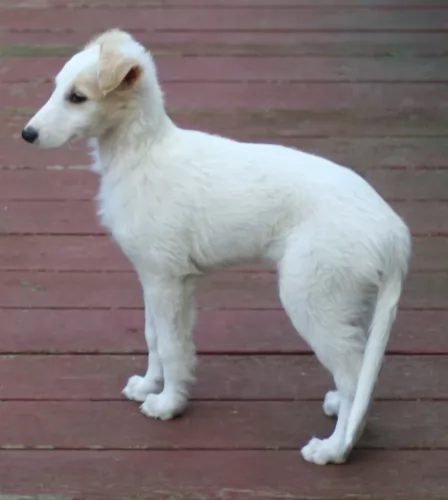 The Silken Windhound is a breed of beautiful, athletic medium sized dogs. They have the long coat, athletic build and classic lines of the sighthound/coursing dog. Just looking at them and you know they have strength, balance and grace in those medium sized bodies. Their running ability is exceptional. They perform well in the confirmation rings.
The Silken Windhound is a breed of beautiful, athletic medium sized dogs. They have the long coat, athletic build and classic lines of the sighthound/coursing dog. Just looking at them and you know they have strength, balance and grace in those medium sized bodies. Their running ability is exceptional. They perform well in the confirmation rings.
They are sine boned, balanced with smooth muscles – a sleek hardy looking dog. They have almond-shaped, large, dark eyes with small folded ears. Looking in their faces you see intelligence, friendliness and alertness. The head is long with a well balanced muzzle and a dark, slightly down-turned nose. Her lips are dark and full and her neck long and slender. The Silken Windhound must have a flexible loin because they have a gallop of double suspensions and are amazingly fast. A deep chest is also a must with a flexible, curving tail. Her legs are straight and long, as she is built for speed.
 The Toy Australian Shepherd, also referred to as the Mini- or Miniature Australian Shepherd is a small dog standing at between 26 - 36 cm in height and weighing between 3 to 9kg.
The Toy Australian Shepherd, also referred to as the Mini- or Miniature Australian Shepherd is a small dog standing at between 26 - 36 cm in height and weighing between 3 to 9kg.
He has a medium-length, weather-resistant coat which is white with tan, black, red or blue merle. The coat is long, and slightly wavy with feathering around the legs and neck.
They eyes can be blue or brown or he can have two differently colored eyes.The tail of these dogs can be a natural bobtail or it is docked. They do shed but they don’t require that much grooming.
These playful little dogs may be small, but they are brave and full of courage. They’re also easy going, and love nothing more than to be around their human family.
They love the games that children play and are always ready to join in, making excellent playmates for children. Lively and alert, they also make good watchdogs and because they are so intelligent, they are easy to train and socialize.
Their intelligence means they need to be physically and mentally stimulated otherwise they can become destructive from sheer boredom. They’re full of energy and will require regular exercise every day.
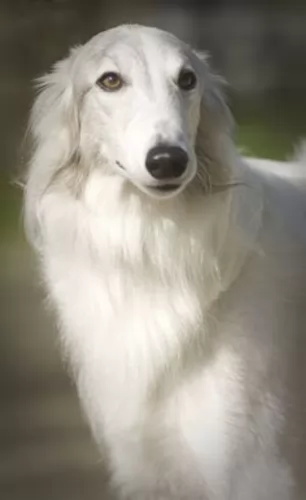 1. Children friendliness – they are great with children and would romp with them all day.
1. Children friendliness – they are great with children and would romp with them all day.
3.Adaptability Like most sighthounds they can be couch potatoes but being medium sized they can live just about anywhere as long as it is inside.
4.Learning ability - They are smart but their learning ability can be hampered by their stubbornness.
 The Toy Australian Shepherd is such a clever little dog and eager to learn too. You won’t have trouble getting him trained and socialized as he is eager to learn.
The Toy Australian Shepherd is such a clever little dog and eager to learn too. You won’t have trouble getting him trained and socialized as he is eager to learn.
He bonds closely with his human family, becoming a loyal, devoted pet. They are also great playmates for children. They’re the kind of dogs that will require mental and physical stimulation if they are to to be prevented from becoming bored and frustrated.
They need social interaction with their human family and will be devastated if they were to be stuck in the backyard and all but forgotten.
They have a lifespan of 12 – 14 years and you want to make sure they’re happy, contented years, because he is wiling to play his part and make you a wonderful pet and companion.
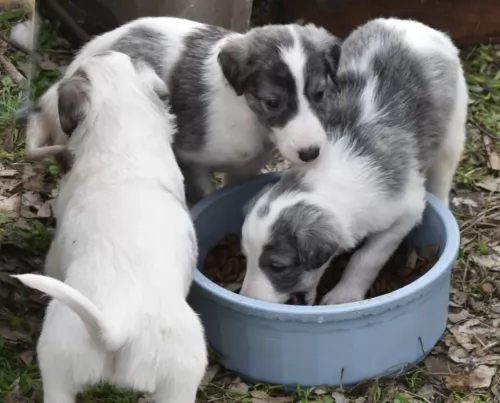 Most inherited diseases and conditions are rare. There is some drug related sensitivity, especially to ivermectin, and some dogs carry a MDR1 (multi-drug resistance gene) that is defective. Breeders are attempting to breed this out of the Silkens. A few other rare instances of concern include:
Most inherited diseases and conditions are rare. There is some drug related sensitivity, especially to ivermectin, and some dogs carry a MDR1 (multi-drug resistance gene) that is defective. Breeders are attempting to breed this out of the Silkens. A few other rare instances of concern include:
 Make sure your Toy Australian Shepherd sees the vet as a puppy to be dewormed and to get his first puppy injections.
Make sure your Toy Australian Shepherd sees the vet as a puppy to be dewormed and to get his first puppy injections.
Dental disease is far more serious than you think. It can affect other areas of your dog’s body. Plaque and inflamed gums lead to bone- and tooth loss.
Bad breath is a sign of periodontal disease. Find out from your vet what to do to guard against periodontitis. It’s important because ignoring bad teeth can lead to heart disease, with bacteria constantly entering the blood stream.
Fleas and ticks are your pet’s enemy as well as heartworm. Dogs can die from heartworm infestations. Heartworm is linked to mosquito bites, so if you live in warm areas, check with your vet for preventative measures.
This is another common dog illness to watch out for. This is a painful condition where the hip joint isn’t formed properly and it can lead to terrible pain and lameness.
Just like people endure endless misery with eczema, dogs too can develop skin allergies. They can create endless frustration and misery for any pet because of the terrible itch and pain. All the licking and scratching can lead to secondary bacterial infections too.
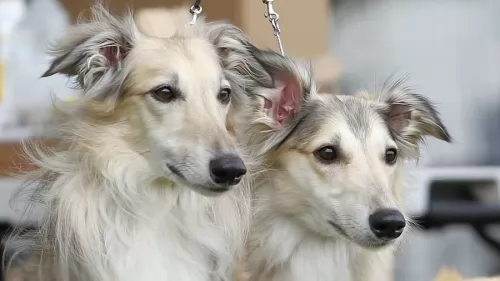 1.Feeding the puppy This is a medium sized, active breed. They need high quality dog food with plenty of protein. Feed them 3 times a day from a food made for high energy active medium sized breeds.
1.Feeding the puppy This is a medium sized, active breed. They need high quality dog food with plenty of protein. Feed them 3 times a day from a food made for high energy active medium sized breeds.
2.Feeding the adult - Feed them 2 times a day from a food made for high energy active medium sized breeds.
4. Games and Exercises The breed is active, and they love to run. They need daily exercise and they usually excel at flyball, agility, obedience and therapy. Obviously, they are very good at lure coursing and racing. They love to run or jog with you.
 Your puppy will need 4 small bowls of food a day. If you’re wondering just how much, either speak to your vet or follow the portion-guide on the packaging of the puppy dog food.
Your puppy will need 4 small bowls of food a day. If you’re wondering just how much, either speak to your vet or follow the portion-guide on the packaging of the puppy dog food.
As your puppy grows older, you feed less frequently so that he is getting two meals a day as an adult. For feeding an adult, there are excellent commercial dog foods available - remember to choose a good brand for your dogs age, size and energy levels.
Try and give him some tasty home-made food too from time to time – nothing exotic and spicy – just plain foods such as boiled chicken, brown rice, spinach, sweet potatoes and carrots. Dogs thrive on simple, healthy food like this. Make sure he always has a bowl of cool, fresh water to drink.
These energetic little bundles of fur will need regular exercise – every day in fact. He’s a smart little dog too, so you need to provide him with stimulating games that will keep his mind and his body physically fit.
Reduce shedding and loose hair by brushing the long hair a least twice a week. This will also help to get rid of matting. Trim nails and check for fleas and ticks.
Provide your Toy Australian with a warm, dry, peaceful place to sleep. If he is outside often, make sure he has both sun and shade to lie in as well as a sheltered spot for when it rains.